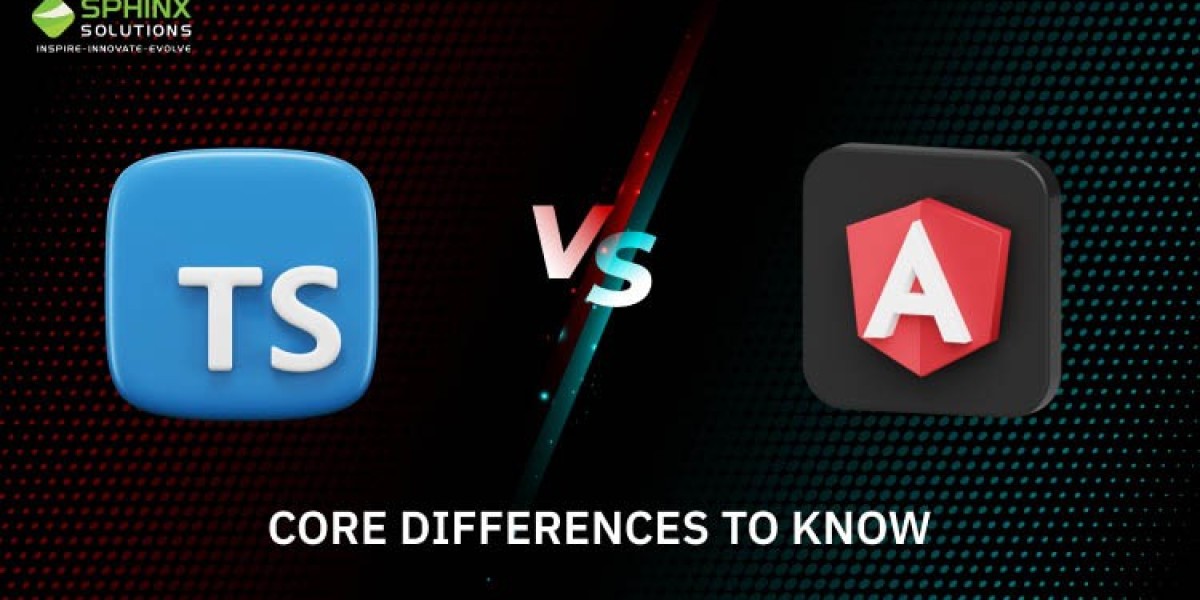In any web application development project, selecting the right frameworks and tools is highly important to make the process successful. TypeScript and Angular both are popular names that play a big role in making robust and intuitive web apps efficiently. Well, both technologies have unique strengths and provide a set of features.
When delving into the realm of app development services, it's crucial to understand the synergy between frameworks and programming languages. In the context of this exploration, we'll specifically unravel the dynamic relationship between TypeScript and Angular, shedding light on their distinct features, divergences, and the collective benefits they bring to the realm of application development. Let’s get started.
What is Typescript?
When venturing into TypeScript development, collaborating with reputable software development companies becomes crucial. TypeScript refers to JavaScript’s superset which is an open-source programming language developed & maintained by Microsoft. This is designed to increase JavaScript with important features that allow mobile app developers to create maintainable and robust code.
It may run on operating systems, devices, and browsers. TypeScript language also adds interfaces, static typing & tools to address errors & offer code completion. This programming language has 3 main components:
- Language: Keywords, syntax, type annotations, etc.
- TypeScript Compiler: It converts the instructions written in TypeScript to its JavaScript equivalent.
- TypeScript Language Service: An extra layer of editor-like apps like signature help, statement completion, colorization, code formatting & other things.
Major Features of TypeScript
TypeScript improves JavaScript and helps developers program in object-oriented ways as compared to JavaScript. Some of the important TypeScript features:
- Static typing: One of the major benefits of TypeScript programming language is static typing. Developers can easily define types for parameters, variables, return values, etc. This helps to address type-related errors and enhances code documentation effectively.
- Type inference: The TypeScript programming language mainly uses types with zero explicit declarations. This can eliminate code verbosity and maintain type safety.
- Interfaces: This language enables developers to define data structures & ensures that objects adhere to a particular structure. Interfaces are useful to ensure codebase consistency.
- Code Completion: TypeScript support editors, like VS Code, offer intelligent code completion and suggestions depending on the defined types. This also improves developer productivity.
- Strict Mode: TypeScript language provides different modes like strictNullChecks, strict, etc to address potential issues & enforce rigorous type checking.
Use Cases for TypeScript
TypeScript comes with a number of use cases. Some of the most popular examples are:
- Big scale applications: TypeScript is used for complex and large codebases. The type-checking and strong typing feature prevents several runtime errors.
- Team collaboration: In team settings, interfaces and strong typing of TypeScript help to maintain consistency & code quality.
- Codebase maintenance: For long and large-scale projects, the code completion and type checking feature of TypeScript simplifies and minimizes the risk of creating bugs.
- JavaScript Frameworks & Libraries: Many JavaScript frameworks & libraries like Angular are developed through the TypeScript programming language.
What is Angular?
Developed by Google, Angular is a popular JavaScript framework that is extensively used to build feature-rich dynamic web applications. As a TypeScript based open-source framework, it can automatically manage browser compatibility.
It also offers a wide range of libraries and tools to make the front-end development process easier. Focused on productivity, testability, and speed, the Angular framework aims to streamline web development.
Angular has two major versions: AngularJS and Angular 2. AngularJS is different from Angular 2 and it has features like c $scope, $scope variables, controllers, etc. In the Angular 2 framework, all these features are replaced by new directives and components and they are used to develop mobile applications with higher performance speeds.
Major Features of Angular
Just like Typescript, Angular framework has a set of features and components. They include:
- Component-based architecture: Angular is known for its component-based architecture that allows developers to build modular & reusable UI elements.
- Dependency injection: The built-in dependency injection system of Angular manages and simplifies injecting dependencies within the application.
- Two-way data binding: Angular offers two-way data binding that keeps the data model and user interface in sync with no updates.
Looking for Web App Development Solutions?
Turn your app idea into reality with our end-to-end web app development services.
- Routing: The built-in routing system of Angular makes it easier to make single-page applications with different routes and multiple views.
- HTTP client: Angular framework mainly includes an HTTP client module to make API requests. This simplifies data manipulation and data retrieval.
- Form Handling: Angular provides advanced tools for handling forms that include data binding and form validation.
- Testing: Angular framework mainly comes with a powerful testing framework. This makes it easier to create end-to-end tests for any web application development.
Use Cases for Angular
Angular is widely used for several purposes. Major use cases of the Angular framework include:
- Single-Page applications: The Angular framework is a great choice for developing SPAs as it has a powerful routing system and component-based architecture.
- Enterprise applications: Large enterprise apps benefit from the extensive features & structure of the Angular framework. This is mostly important when high scalability & strict organization are needed.
- Real-time applications: Reactive programming capabilities & two-way data binding of Angular are ideal for real-time applications such as collaborative tools & dashboards.
- Cross-platform development: The Angular framework mainly supports native application development through major tools such as Ionic. This allows professional developers to create both mobile & web applications development with codebase.
Typescript vs Angular: Key Comparisons
While TypeScript and Angular both are utilized independently, they can be used together to build robust web applications. Here are the key differences:
Aspects | Angular | TypeScript |
Definition | Angular is a frontend framework of avaScript which is used to create web applications. | TypeScript is a JavaScript superset that adds static typing to the programming language. It is used to make large-scale applications. TypeScript is also used for both backend & frontend development. |
Developers | Microsoft Corporation | |
Language | Angular utilizes TypeScript language as the primary programming language | TypeScript is a programming language and it can also be used without Angular. |
Use Cases | Angular is used for developing web applications and single-page applications (SPAs). | TypeScript is utilized for JavaScript development, including backend services, building web applications, and so on. |
Community | Angular has an active & strong developers community. This means there are a number of third-party libraries and resources available. | TypeScript has a growing & large community because of its scalability & usefulness in JavaScript. |
Data Binding | Angular offers two-way data development that makes it simpler to keep the data and user interface in sync. | TypeScript language does not offer data binding but when it is used with Angular, it provides a dedicated data binding mechanism. |
Dependency Injection | It provides an excellent dependency injection system to manage dependencies in a proper way. | TypeScript language doesn’t come with a built-in dependency injection system. |
Tooling & IDE Support | Angular comes with several tools and IDEs (integrated development environments) designed for Angular development. | TypeScript is well-structured through powerful IDEs & code editors. It also comes with a set of developer tools. |
Performance | Angular provides better performance due to optimizations like AOT (Ahead-of-Time) compilation. | As a [programming language, TypeScript does not have any impact on application performance. It relies on how it is used in the application context. |
How to Combine Typescript with Angular?
- Type Safety: The interfaces and static typing of Typescript align with the component-based architecture of Angular. It mainly ensures that the application will be reliable and type-safe.
- Ecosystem compatibility: Many third-party packages & libraries are available for TypeScript and the Angular framework. This always ensures better compatibility with existing solutions as well as tools.
- Productivity: The development and productivity are improved with Angular’s modularity and code completion of TypeScript. This combination can make the development process error-free and more efficient.
- Code quality: TypeScript language mainly enforces strict type checking that improves code quality and eliminates the risk of runtime errors. The structured approach of Angular encourages better coding practices.
- Resources & Community: Angular & TypeScript both have extensive documentation & vibrant communities. This makes it simpler for developers to identify resources and solutions while facing challenges.
Typescript vs Angular Which One do You Choose?
Before you choose TypeScript or Angular, you need to consider all your project goals and requirements. Here are a quick guidelines that help you make the right decision:
Select TypeScript If:
- You want type checking & strong typing.
- Your project is JavaScript based & want to enhance code quality.
- Your project is unable to need a full-fledged open-source framework like Angular.
Select Angular If:
- You want to make a complex web application or a single-page application.
- You need an opinionated and structured framework with different built-in features.
- You are in search of a great solution including form handling, routing, testing, etc.
Choose Angular with Typescript If:
- You need a combination of a comprehensive framework and strong typing.
- You are working on a large-scale and long-term project where code quality & maintainability are critical.
Want to Hire Web App Developers?
Simplifies your business ideas with our next-gen mobile application development services.
Final Words
TypeScript and Angular both are valuable for making feature-rich web applications in an efficient way. While TypeScript language improves JavaScript with a set of features, Angular offers a well-structured framework that is used to build dynamic web applications flawlessly. Before you choose TypeScript & Angular framework, you have to focus on your project needs and requirements. By finding individual features & capabilities of both technologies, you will make your decision when selecting the right one for your project.



